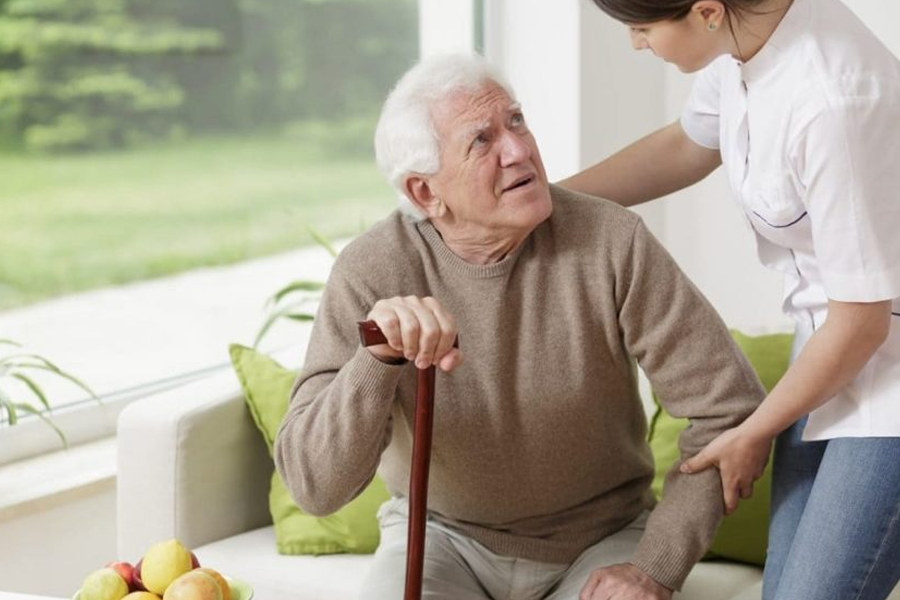Blog
Recognizing the Early Signs of Stroke, Heart Attack, and Dementia in Seniors

At Home Care, Inc. | Serving Mississippi’s Seniors Since 1998
Early detection can save lives when it comes to senior health. Families can take prompt action and make well-informed decisions when they are aware of the warning signs of serious issues including dementia, heart attacks, and stroke. Serving seniors in Mississippi for more than 25 years, we at At Home Care, Inc. have witnessed firsthand how knowledge and prompt action can transform results. Knowing what to look for could mean the difference between a healthy recovery and a life-altering event, whether you are a senior yourself, a family member, or a caregiver. Here’s what to watch for:
1. Stroke: “Time Lost Is Brain Lost”
Strokes happen when blood flow to part of the brain is interrupted, leading to brain damage. Since most stroke therapies only work for a short period (typically 3–4.5 hours), quick therapy is essential.
FAST: The Most Important Acronym to Know
Use this simple test to remember the most common stroke signs:
F – Face Drooping: Ask the person to smile. Is one side drooping?
A-Arm Weakness: Ask them to raise both arms. Does one drift down?
S – Speech Difficulty: Is their speech slurred or strange?
T – Time to Call 911: If any signs are present, act fast.
Other Warning Signs
• Sudden confusion or trouble understanding
• Changes in one or both eyes’ vision
• dizziness, unsteadiness, or difficulty walking
• Sudden, severe headache with no known cause
Emergency Advice: Call 911 instead of driving them to the hospital. On the route, EMS can start life-saving care.
2. Heart Attack: More Than Just Chest Pain
Heart attacks occur when blood flow to the heart muscle is blocked, often by a clot. They may be confused with other conditions since they might appear very different in older people,
particularly in women. Classic Symptoms
• Pressure or pain in the chest, often described as tightening, size, or squeezing
• Pain that spreads to the jaw, neck, back, arms, or stomach
• Lack of breath Atypical Signs (especially in seniors and women)
• Nausea or vomiting
• Lightheadedness or fainting
• Cold sweat
• Sudden fatigue or weakness
• Indigestion-like discomfort
Important Note: Due to age-related changes in pain perception, seniors may minimize or not experience chest pain at all. Always take symptoms seriously, even if they seem “mild.”
3. Dementia: Subtle Signs That Can Be Easy to Miss
A progressive loss of cognitive function that interferes with day-to-day functioning is called dementia. Alzheimer’s disease is the most common form, but many types exist. Unlike stroke or heart attack, dementia often creeps in slowly, making it harder to identify in its early stages. Early Warning Signs
• Memory loss that disrupts daily life (e.g., forgetting appointments or names)
• Trouble following conversations or finding the right words
• Difficulty planning or solving problems (e.g., paying bills)
• Getting lost in familiar places
• Changes in personality, mood, or behavior
• Poor judgment or decision-making
• Misplacing items and being unable to retrace steps Normal Aging vs. Dementia
• Forgetting where you put your keys = Normal aging
• Forgetting what keys are used for = Possible dementia
Helpful Tip: Make a note of any behavioral changes you see and let a healthcare professional know about them. More treatment options and planning are made possible by early diagnosis. What You Can Do Today
1. Talk About It
Many seniors feel embarrassed or afraid to mention symptoms. Establish a public forum for health-related discussions. Gently ask questions like:
• “Have you recently noticed anything unusual in your memory?”
• “Have you experienced dizziness or weakness in your arms or legs?”
• “Has your chest been under any pressure lately?”
2. Schedule Routine Screenings
Encourage annual wellness exams that check blood pressure, cholesterol, and cognitive health. Seniors should see their doctors more often if they have long-term health issues like diabetes or heart disease.
3. Involve Home Care Professionals
Assistants at Home Care, Inc. are taught to spot and report health changes that family members might overlook. To make sure symptoms aren’t missed, we collaborate closely with customers’ doctors and loved ones.
When to Call for Help
Don’t hesitate. Dial 911 right away if you think someone may be having a heart attack, stroke, or sudden brain damage. Waiting even an hour can lower the possibility of recovery, thus time is essential.
Early diagnosis by a physician or neurologist is crucial for dementia. It’s the first step toward understanding what’s happening and making a plan for care and safety.
How At Home Care, Inc. Can Help
• Personalized Observation: Our caregivers are educated to spot minor changes in a senior’s health.
• Emergency Preparedness: We assist families in creating emergency plans that include emergency contacts and medication tracking.
• In-Home Monitoring: We help seniors achieve their health goals and provide families peace of mind by making routine visits.
• Support for Mental Health: To assist support in adjusting to emotional and cognitive changes, we provide outpatient mental health and psychosocial rehabilitation programs.
Final Thoughts: Awareness is Power The earlier you identify the symptoms of dementia, heart attack, or stroke, the better. Because aging in place should be associated with safety, support, and confidence, At Home Care, Inc. is here to help you every step of the way. Call us if you need assistance identifying the warning signs or if you have concerns about the health of a loved one. Together, we can make sure no symptom goes unnoticed—and no senior is left to face health challenges alone.
